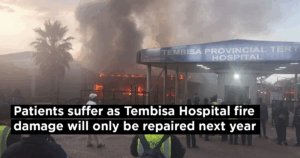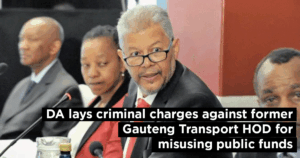Gauteng remains gripped by fear, and ordinary residents are left to fend for themselves against ruthless criminals. This is the reality about Gauteng residents under the leadership of Premier Panyaza Lesufi, whose promises on fighting crime are loud, but action is nowhere to be seen.
The Democratic Alliance (DA) in Gauteng has experienced this first-hand while criss-crossing the province to assess the severity of crime and its impact on the residents of Gauteng as part of our Anti-Crime Campaign. Our engagements have not only revealed the rising levels of crime but also the concerning under-resourcing of our 144 police stations and police officers meant to curb it.
Akasia police station in Pretoria North is a glaring example of neglect by the South African Police Service (SAPS), which is directly responsible for SAPS resourcing. The station is supposed to have 48 vehicles but has 24 of which only 13 are currently operational. Only five police vehicles are available for visible policing to cover approximately 150 square kilometres of the area.
Vehicle shortage is also a concern at the Johannesburg Central Police Station, where officers are often hindered by ageing patrol vehicles breaking down in the congested city centre, allowing suspects to flee on foot and vanish into nearby hijacked buildings.
This is not surprising, as Premier Lesufi has responded to a question from the DA, revealing that 710 out of 5,630 police vehicles in the province are not serviceable. While SAPS resourcing falls under the national government, Lesufi’s failure lies in his inability to effectively use his provincial platform to hold them accountable and ensure proper oversight. This situation not only hampers crime prevention and reduces police visibility but also emboldens criminals who are aware that the system meant to protect them is failing.
The critical shortage of vehicles and holding cells is worsened by the appalling conditions at many police stations. Officers must work in facilities with poor sewage systems, leaking roofs, and dilapidated bathrooms. In some stations, the electricity supply is unreliable, and there are no functioning telephone lines.
Furthermore, a serious understaffing crisis continues to cripple many of the police stations. At the Midrand Police Station, for instance, detectives are overwhelmed with heavy workloads, making it nearly impossible to provide residents with the effective services they deserve. Furthermore, this police station, like many, is overcrowded.
See the DA Gauteng Policing Needs and Analysis Findings here.
There is no doubt that a clear link exists between the lack of policing resources and the province’s inability to deter criminal behaviour. Gauteng recorded 1,439 murders in the fourth quarter of the 2024/2025 financial year. The province remains the second-highest contributor to murders nationally at 25.1%. Of these, 765 murders occurred in public places using firearms, highlighting a lack of deterrence.
We can also confirm from our engagement that many of our police officers are doing their best under challenging circumstances. They are being let down by a broken system at a national level and a Premier who insists on keeping the Department of Community Safety under his direct oversight, despite lacking the capacity to manage it effectively.
It is high time that the Premier accepted that he has failed to address the fundamental challenges facing policing in Gauteng. His introduction of high-tech crime-fighting tools, such as CCTV cameras and drones, many of which are not even operational, has not yielded any results. Meanwhile, the less said about the Gauteng Crime Wardens, the better. They are always missing in action.
It is also time he stopped deflecting responsibility and blaming his national counterparts for everything that goes wrong. Instead, he must push for the devolution of policing powers, empowering competent provinces to make meaningful decisions at the provincial and local levels where the impact is most needed.
The DA through the Gauteng Portfolio Committee for Community Safety will request Premier Lesufi to make public the province needs and priorities list document submitted as part of the National Policing Policy that was approved by the national cabinet on 15 May 2025. The DA-led Western Cape needs and priorities list it accessible to the public and they follow consultative process. We will table questions to request the full report, determine why it has not been tabled in the Legislature and made public.
A DA-led Gauteng Provincial Government would not have spent senselessly on crime-fighting gimmicks that offer little to no value for money for the people of Gauteng. We would invest in properly equipping and supporting our police officers who remain under-resourced, unsupported, and overwhelmed as they work tirelessly to keep our communities safe.








